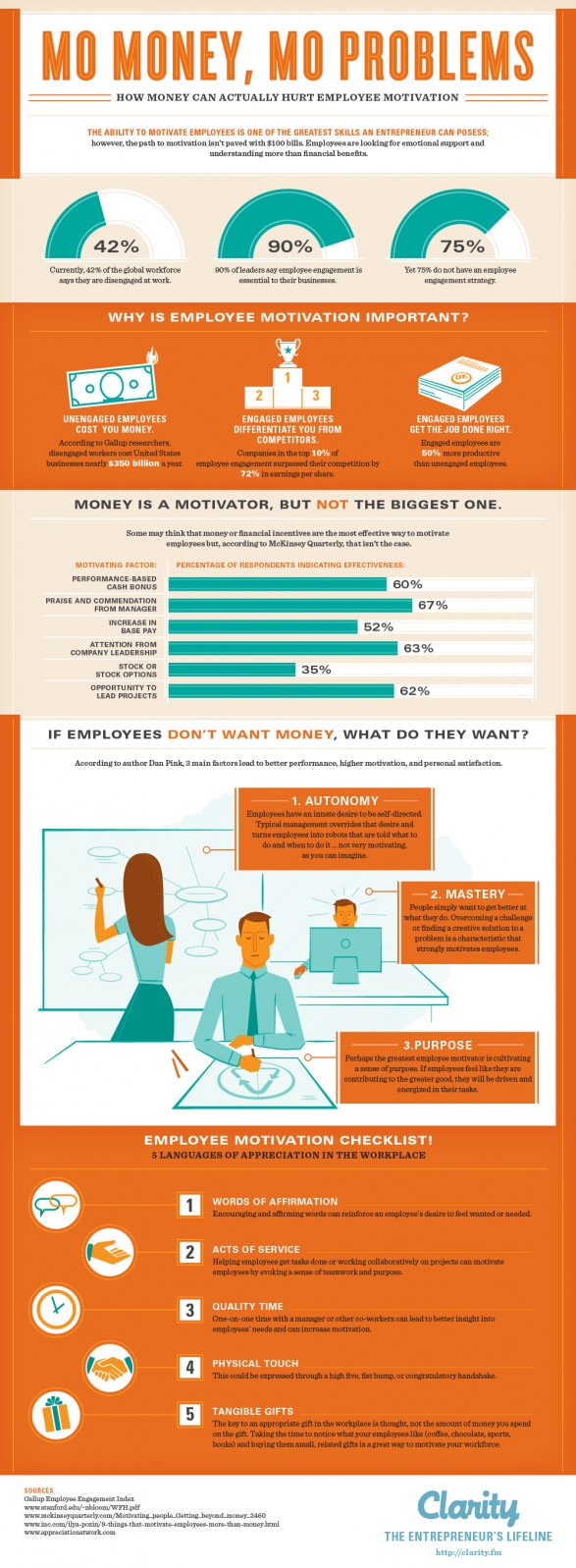In This Article
(Click the links below to move easily to sections of this article)How Can I Motivate My Employees?
What are Intrinsic Rewards?
Motivation Requires More than Money!
Video: What Are Intrinsic Rewards
Motivation in the Workplace Article Series
Member Content
- Lesson: How to Motivate Your D Style (Direct, Strong-Willed, Let’s-Get-It-Done-Now) Employees
- Lesson: How to Motivate Your I Style (Outgoing, Talkative, Let’s-Get-It-Done-Together) Employees
- Lesson: How to Motivate Your S Style (Observant, Unassertive, Let’s-Get-It-Done-Peacefully) Employees
- Lesson: How to Motivate Your C Style (Analytical, Questioning, Let’s-Get-It-Done-Right) Employees
- Special Report: 9 Steps to a Motivated Workforce
- Special Report: 30 Low & No Cost Ways to Reward Your Employees
Back to Top
How Can I Motivate My Employees?

As I work with organizational managers and leaders from various industries, getting help with this question is often their most pressing need. Sometimes these managers have a “problem employee” who does not take responsibility for his or her work. Other times these managers have “that worker from another generation” whose work ethic they just do not understand.
As I work with them, these managers often express their feelings to me as follows:
Robert, I really need this employee to do his job! I pay him well. He has good benefits. I know he knows how to do the job because sometimes he gets it done. He just won’t do it! He has an attitude problem.
It’s true that people should do their jobs but managers also can do more to create an environment where their employees want to give them their best effort. What do I mean? Well, money and benefits are important but research consistently shows that compensation alone has limited motivational staying power.
A good salary alone will not keep employees motivated. That's just the first of many steps managers need to make. Click To Tweet(Think about it! How enthused are you about that raise you received two years ago? Do you still feel that initial emotion of excitement when you first heard the news of your pay increase?)
Money and benefits are extrinsic rewards. They are environmental rewards that are separate from completing the work itself.
Extrinsic rewards are important. They’re powerful when they integrate with a critical employee need. To read my personal story about the power of a well-timed extrinsic reward, click here.
Back to Top
What are Intrinsic Rewards?

To create lasting motivation, you can’t just give your employees extrinsic rewards. Motivation also requires intrinsic rewards. Employees need to receive some value from actually doing the work (intrinsic rewards).
If you want employee engagement you’ll need to provide intrinsic rewards. You’ll need more than money and benefits! You’ll have to take specific actions to make the actual work that your employees are doing rewarding.
Employees care about good pay but they also want to work in a productive work environment where they can learn and grow under the direction of a sane and fair boss. Click To TweetFortunately, there are many things that you can do to provide intrinsic rewards just by adapting your leadership style. Five intrinsic rewards you can provide to your employees are the following:
1. Look for opportunities to give your employees positive feedback. Catch them doing something right and recognize them for their good performance. (Intrinsic reward: the employees get recognition when they perform well. Recognition!)
2. Respect your employees dignity when you have to coach them for performance problems. Follow the management saying: praise in public, correct in private. Engage the employee in a two-way discussion about their performance issue. Provide support. (Intrinsic reward: the employees work for a supportive boss who helps them to succeed. Personal growth!)
3. Include your employees in operational decision-making. Ask their opinion before you drastically change processes and procedures. Make them an active part of solving organizational problems. (Intrinsic reward: the employees have influence over how departmental work is done. Participation in operational decision making!)
4. As your employees demonstrate their ability and desire to perform good work, loosen up your rein of control over them. Allow them to make some independent decisions about their work. As much as possible, allow room for variation in how work is done. (Intrinsic reward: the employees have autonomy in how they complete their work. Greater job freedom and discretion!)
Some managers motivate their employees through their leadership styles while other managers de-motivate their employees through their leadership interactions. Click To Tweet5. Strive to get the right employees doing the work that best aligns with their skills and interests. Instead of concentrating on what your employees cannot do, look instead for what they can do. As feasible, readjust work and train and mentor your employees so they can succeed. (Intrinsic reward: the employees have challenging work that fits their skills and interests. Challenging and interesting work!)
Back to Top
Motivation Requires More than Money!
As the following infographic from Clarity explains, the added benefit of intrinsic rewards is that they are usually no-to-low cost for the organization. Money alone is not motivating to employees.

Do you want motivated employees working for you who are committed to giving you their best? If so, you’ll need to give them more than money and benefits. Intrinsic rewards are a critical part of any employment engagement effort.
Motivation requires more than just good pay. Click To TweetBack to Top
Video: What Are Intrinsic Rewards
Motivation in the Workplace Article Series
- What is Motivation?
- Motivation – Applying Maslow’s Hierarchy of Needs Theory
- Equity Theory – Why Employee Perceptions About Fairness Do Matter
- There’s Room For Vroom’s Expectancy Theory in Employee Motivation
- Motivation – As Simple As The Three Needs Theory
- Intrinsic Rewards – You’ll Need More Than Money and Benefits!
- How to Ruin Employee Motivation
- Top 5 Employee Motivators
*Infographic courtesy of Visual.ly.
This article is accurate to the best of the author’s knowledge.
Content is for informational or educational purposes only and does not substitute for professional advice in business, management, legal, or human resource matters.